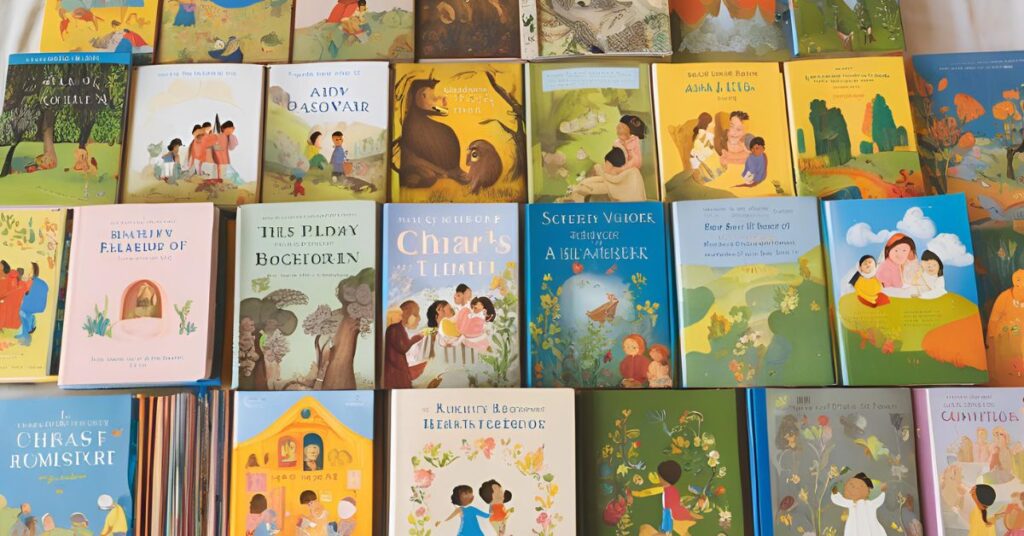Understanding why books are important in our lives goes beyond mere entertainment. Books profoundly shape who we are by imparting profound lessons, whether through the pages of a self-help guide that provides us with tools for personal growth or through historical accounts that deepen our appreciation of past events. They offer solace in times of distress, wisdom in moments of doubt, and inspiration when we need it most.
Books have a unique way of touching our hearts and minds, offering us experiences and insights we might never encounter otherwise. They can transport us to different worlds, introduce us to diverse perspectives, and build a wide range of emotions. Whether it’s the comfort of a bedtime story that nurtures our sense of security and imagination, or the thrill of an adventure that fuels our desire for exploration and wonder, books play an integral role in our emotional and intellectual development.

A Gateway to Knowledge
Why Books Are Important in Our Lives is a question with many profound answers. Books stand as one of humanity’s most accessible gateways to knowledge. They span across disciplines, offering insights into history, science, philosophy, art, and more. Each book is a reservoir of information, enriching our minds and broadening our perspectives on the world. Through reading, we tackle intellectual journeys that shape us into more informed and educated individuals.
- Social Justice: Books often tackle issues of inequality, discrimination, and human rights, shedding light on societal challenges and advocating for change.
- Mental Health: Literature explores the complexities of mental illness, offering empathy and understanding while promoting mental wellness through narratives of struggle and resilience.
- Environmental Awareness: Books on ecology and sustainability raise awareness about environmental issues, urging readers to take action to preserve our planet’s future.
- Ethical Dilemmas: Fiction and non-fiction alike explore ethical questions, challenging readers to consider moral complexities and their implications in decision-making.
Books not only inform but also empower us to engage critically with the world around us. They ignite curiosity, encourage empathy, and inspire us to contribute positively to society. Understanding Why Books Are Important in Our Lives helps us appreciate the power they hold in shaping our thoughts, values, and actions.
Exploring the Power of Emotions and Self-Expression
Books provide a unique medium for exploring and expressing emotions, and this is one of the reasons Why Books Are Important in Our Lives. They allow us to delve deep into the human psyche, understanding the complexities of feelings and relationships. Through characters and narratives, we can experience a wide range of emotions, from joy and love to sorrow and despair. This exploration helps us to process our own emotions and gain insight into the experiences of others, fostering empathy and emotional intelligence.
Books serve as a mirror, reflecting our innermost thoughts and feelings, and as a window, offering glimpses into the emotional worlds of others. This duality is what makes them such powerful tools for self-expression and emotional exploration. Whether it’s through the lyrical beauty of poetry, the gripping intensity of a novel, or the reflective prose of a memoir, books give voice to our emotions, helping us to articulate and understand them better.

By engaging with the emotional journeys of characters, we develop a deeper sense of empathy and emotional intelligence. We learn to recognize and respect the emotional experiences of others, which in turn enhances our ability to connect and communicate in our own lives. This is why books are not just important but essential in fostering a more emotionally intelligent and empathetic society.
Mental Stimulation
Engaging with books keeps our minds active and sharp. Why Books Are Important in Our Lives goes beyond just acquiring knowledge; it encompasses the crucial role they play in mental stimulation and the Power of Your Subconscious Mind. Reading stimulates mental processes, enhances critical thinking, and improves concentration. Each page turned is like a workout for the brain, promoting cognitive health and potentially staving off cognitive decline as we age. Books challenge our minds, introduce us to new ideas, and encourage us to think deeply, making them indispensable tools for maintaining mental agility and overall brain health.

Key Benefits of Mental Stimulation Through Books
- Enhanced Critical Thinking: Books encourage us to analyze, interpret, and evaluate information, sharpening our critical thinking skills.
- Improved Concentration: Reading requires focus and attention, helping to improve our ability to concentrate over time.
- Cognitive Health: Regular reading stimulates the brain, potentially delaying cognitive decline and reducing the risk of diseases like Alzheimer’s.
- Stress Reduction: Immersing ourselves in a good book can provide an escape from daily stresses, promoting relaxation and mental well-being.
- Expanded Vocabulary: Exposure to diverse language and ideas in books enhances vocabulary and improves communication skills.
Books are Your Escape and Relaxation Companion
Ever find yourself needing a break from the daily grind? That’s where books swoop in like your best buddy, offering a much-needed escape. Why Books Are Important in Our Lives extends far beyond knowledge and education. They’re your ticket to relaxation and rejuvenation. Imagine diving into a captivating story suddenly, you’re whisked away from the hustle and bustle, finding relaxation and stress relief in the pages before you. It’s not just about zoning out; books create a sanctuary where you can unwind and recharge, away from the pressures of everyday life. In our fast-paced world, where the pressure never seems to let up, books become your go-to for maintaining mental well-being, offering solace, and providing a moment of peace amid the chaos.
Personal Growth: Why Books Are Important in Our Lives
Books possess the remarkable ability to catalyze personal growth in profound ways. Whether through self-help manuals, memoirs, or philosophical treatises, literature serves as a guiding light on our journey toward self-improvement. These literary treasures not only impart knowledge but also ignite introspection, prompting us to reassess our beliefs and aspirations. By exploring diverse perspectives and narratives, books expand our understanding of the human experience and inspire us to evolve into better versions of ourselves.
Benefits of Books for Financial Growth
- Financial Education: Books on finance provide knowledge about investing, saving, and managing money effectively.
- Entrepreneurial Insights: Business and entrepreneurship books offer strategies and insights for starting and growing businesses.
- Investment Strategies: Books on investing educate readers on different investment strategies and financial planning.
- Career Advancement: Books on professional development guide career growth, negotiation skills, and leadership.
- Financial Independence: Reading about personal finance empowers individuals to achieve financial goals and attain independence.
Fostering Imagination and Creativity
Books play a crucial role in nurturing our imagination and fostering creativity. Whether immersing ourselves in the imaginative realms of fiction or absorbing the detailed narratives of non-fiction, reading stimulates our creative thinking. This process is vital not only for writers and artists but for everyone seeking to innovate and think beyond conventional boundaries.

Through books, we encounter diverse perspectives, explore new ideas, and envision possibilities that transcend our immediate reality. Fictional stories challenge us to empathize with characters, solve complex problems, and explore moral dilemmas. Non-fiction exposes us to real-world experiences, historical events, and scientific discoveries, inspiring us to apply knowledge in innovative ways.
In today’s fast-paced world, where innovation drives progress across all fields, books serve as catalysts for creativity and critical thinking. They empower individuals to explore alternative solutions, challenge assumptions, and envision a future shaped by limitless imagination.
Building Vocabulary and Communication Skills
Understanding why books are important in our lives includes recognizing their role in enhancing vocabulary and communication skills. Books serve as excellent tools for improving language proficiency. They introduce us to a myriad of new words and phrases, embedding them in contexts that help us understand their usage and nuances effectively. By expanding our vocabulary, books enable us to express ourselves more articulately and confidently, both in personal interactions and professional environments.
Moreover, the improved communication skills acquired through reading are invaluable. Books not only teach us language but also demonstrate diverse communication styles and techniques. They expose us to different narrative structures and dialogue patterns, fostering a deeper understanding of effective communication strategies.
In personal settings, a rich vocabulary enables us to articulate thoughts and emotions with clarity, enhancing interpersonal relationships and fostering deeper connections. Professionally, strong communication skills are essential for conveying ideas persuasively, collaborating effectively, and advancing in careers that require clear and concise expression.
Thus, the impact of books on vocabulary and communication skills extends far beyond words on a page. They empower us to communicate effectively, navigate complexities, and contribute meaningfully to our communities and workplaces.

The Importance of Illustrated Books in Child Development
Illustrated children’s books are vital for a child’s brain and emotional development. The vivid pictures help children understand the story better and make reading a more engaging and enjoyable activity. These books stimulate imagination and creativity, enhance visual thinking skills, and aid in the development of language and literacy. Illustrated books also provide a bonding experience between parents and children, fostering a love for reading early on. Explore our Children’s Books Collection to find beautifully illustrated books that can support your child’s development.
Books Unlocking the Poet
Writing poetry is a beautiful way to express emotions and thoughts creatively. To unlock the poet within, start by reading a wide range of poetry to understand different styles and forms. Experiment with writing regularly, using vivid imagery and strong emotions to convey your message. Join poetry workshops or online communities to get feedback and improve your skills. Remember, poetry is personal, so let your unique voice shine through your words. Check out our guide on How to Write Poetry for more tips and inspiration.
Why Reprogramming Your Mind for Success is Crucial
Why Books Are Important in Our Lives, reprogramming your mind for success is not just about changing habits. It’s about transforming your entire mindset. Begin by identifying and challenging negative beliefs that may be holding you back. Incorporate positive affirmations and visualization techniques to foster a new, success-oriented perspective. Mindfulness and meditation practices to enhance focus and reduce stress levels. Surround yourself with supportive, like-minded individuals who uplift and inspire personal growth. By consistently setting and achieving small goals, you can cultivate confidence and momentum toward achieving your larger aspirations. For a comprehensive guide on how to reprogram your mind for success, explore our detailed article on How to Reprogram Your Mind for Success.

Why Books Are Important in Improving Your Sleep Quality
Reading the right books before bed can significantly enhance your sleep quality. Selecting calming and relaxing literature helps you unwind, whether it’s gentle fiction or non-fiction that piques your interest without overstimulating your mind. Establishing a consistent bedtime routine that includes reading signals to your brain that it’s time to wind down for sleep. It’s essential to avoid screens and bright lights while reading, as these can disrupt your natural sleep-wake cycle. Instead, create a comfortable and cozy reading environment that promotes relaxation and tranquility. By incorporating bedtime reading into your nightly routine, you can experience quicker sleep onset and more restful sleep throughout the night.
How to Find Eternal Devotion in Your Relationship
Discovering eternal devotion in a relationship is a journey that demands commitment, effective communication, and mutual understanding. It begins with prioritizing quality time together and fostering an environment where expressions of appreciation and love are frequent and genuine. Effective communication forms the cornerstone of this journey, requiring active listening and empathy towards your partner’s needs and concerns. Trust, built on honesty and reliability, solidifies the foundation of a lasting bond.
Constructively addressing conflicts and challenges becomes an opportunity for growth, allowing both partners to navigate shared experiences and goals together. Eternal devotion flourishes from a profound, mutual respect and an ongoing commitment to nurture the relationship. In the context of literature, books can provide insights into relationships, offering narratives that resonate with our own experiences and inspiring us to cultivate enduring love and dedication in our lives.
Why Mental Health Books Are Important in Our Lives
Mental health books serve as invaluable resources for understanding and healing. They provide profound insights into various mental health conditions, offering coping strategies, therapeutic techniques, and expert advice from psychologists and psychiatrists. By delving into these books, readers can demystify complex topics surrounding mental health, gaining practical tools to manage their well-being effectively.
Personal memoirs and stories of recovery shared in these books offer more than just knowledge; they provide comfort and inspiration. These narratives remind us that we are not alone in our struggles, offering a sense of solidarity and hope. Through reading about mental health, individuals can develop greater empathy and understanding, contributing to the reduction of stigma associated with mental illness.

Key Benefits of Mental Health Books
- Empowerment: Books empower individuals by providing knowledge and strategies to manage mental health challenges effectively.
- Inspiration: Personal stories of recovery inspire hope and resilience, showing that recovery is possible and encouraging individuals to seek help.
- Education: Books educate both individuals and communities about mental health conditions, promoting awareness and understanding.
- Support: Mental health books offer support to readers by validating their experiences and providing practical advice for navigating difficult emotions and situations.
Conclusion
Books are more than just words on a page; they are portals to different worlds, reservoirs of knowledge, and companions in our journey through life. Why Books Are Important in Our Lives becomes clear as they enrich our minds, broaden our perspectives, and deepen our understanding of the world and ourselves. They serve as a refuge from the noise of daily life, offering moments of reflection and insight that are increasingly rare in today’s fast-paced world.
In a world where we are constantly bombarded with information, the value of sitting down with a good book remains unparalleled. By immersing ourselves in the narratives and ideas of others, we expand our empathy, compassion, and understanding of different cultures and perspectives. Books can serve as a source of comfort during difficult times, offering solace and a sense of connection to others who have experienced similar struggles.
Frequently Asked Questions (FAQ)
What genres of books are best for personal growth and self-improvement?
Genres such as self-help, personal development, memoirs, and philosophical literature are particularly beneficial for personal growth and self-improvement. These books offer insights into overcoming challenges, developing new perspectives, and setting goals for self-improvement. They inspire readers to reflect on their lives, learn from others’ experiences, and strive towards becoming their best selves.
What are some tips for finding the right book to read?
Finding the right book involves considering personal interests, genre preferences, and reading goals. Readers can explore book reviews, recommendations from friends or online communities, and bestseller lists to discover new titles. It’s important to choose books that resonate personally and offer content that aligns with individual preferences and learning objectives.
How can reading contribute to lifelong learning and personal development?
Reading encourages lifelong learning by exposing individuals to new ideas, information, and perspectives. It promotes curiosity and a desire for continuous self-improvement. Through reading, individuals can stay informed about advancements in various fields, expand their knowledge base, and develop critical thinking skills essential for navigating an ever-changing world.
What role do book clubs play in fostering community and shared experiences?
Book clubs provide a platform for readers to discuss books, share insights, and connect with others who share similar literary interests. They foster a sense of community by bringing people together to explore themes, characters, and plotlines. Book clubs encourage lively discussions, promote critical thinking, and expand participants’ understanding of literature and the world around them.
How can parents encourage a love for reading in children?
Parents can encourage a love for reading by making it a fun and positive experience. Start reading to children from a young age, incorporating storytelling into daily routines. Allow children to choose books that interest them and create a cozy reading nook at home. Model reading behavior by letting children see you enjoy reading regularly. Joining library programs or book clubs can also expose children to a variety of books and foster a community of readers.
How can reading fiction books improve empathy and social skills?
Reading fiction allows readers to immerse themselves in characters’ lives, experiences, and emotions. This immersion helps develop empathy by enabling readers to understand and relate to perspectives different from their own. As readers navigate complex character relationships and dilemmas, they also enhance their social understanding and interpersonal skills.
How does reading before bed affect sleep quality and overall well-being?
Reading before bed can promote relaxation and improve sleep quality by creating a calming bedtime routine. However, it’s essential to choose books that are not overly stimulating or intense, as these can interfere with the transition to sleep. By incorporating reading into a nightly wind-down ritual, individuals may experience reduced nighttime anxiety, enhanced relaxation, and more restful sleep patterns.
How can parents and caregivers select age-appropriate books for children’s reading development?
Selecting age-appropriate books involves considering a child’s reading level, interests, and developmental stage. Look for books with engaging illustrations, simple text, and themes that resonate with the child’s experiences and curiosity. Children’s literature categorized by age groups, such as board books for infants, picture books for toddlers, and chapter books for older children, can guide selection based on developmental milestones and literacy skills.
What role do audiobooks play in enhancing the reading experience?
Audiobooks offer a convenient alternative to traditional reading, allowing listeners to enjoy books while multitasking or during activities where reading a physical book may not be practical. Audiobooks enhance the reading experience by providing narrated storytelling, character voices, and atmospheric sound effects that bring narratives to life. They also support auditory learners and individuals with visual impairments in accessing literary content.
How can reading aloud to children benefit their language development and literacy skills?
Reading aloud to children supports language development by exposing them to rich vocabulary, sentence structures, and literary language patterns that enhance oral communication skills. It fosters a love for storytelling, promotes active listening, and cultivates early literacy skills, such as phonological awareness and comprehension. Reading aloud also nurtures parent-child bonding, creates positive reading associations, and encourages children to become confident and enthusiastic readers.
Can reading books on personal finance and investing improve financial literacy?
Yes, reading books on personal finance and investing can significantly enhance financial literacy. These books provide valuable insights into budgeting, saving, investing, and managing money effectively. They offer practical strategies, tips, and case studies that empower readers to make informed financial decisions, plan for the future, and achieve financial independence. By educating themselves through financial literature, individuals can develop essential skills and knowledge to navigate economic challenges and build long-term financial security.





